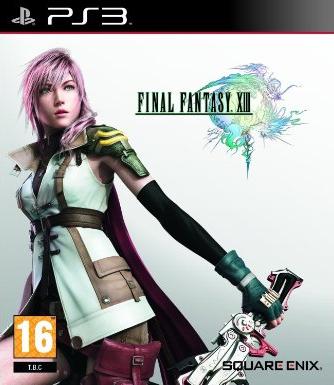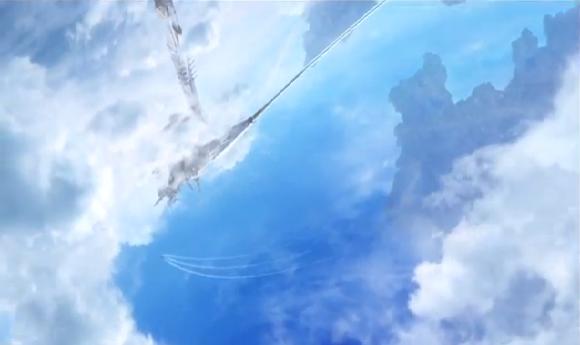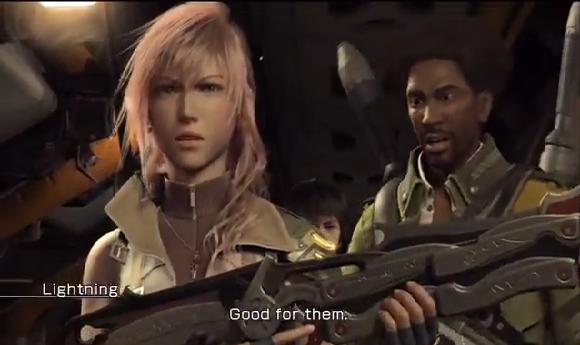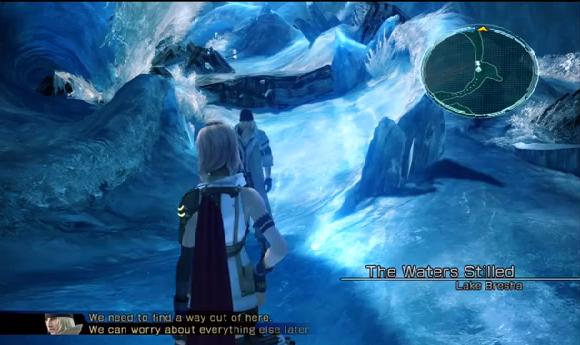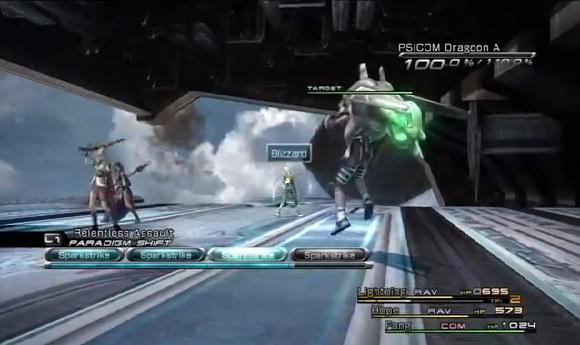FINAL FANTASY XIII (PS3)
Such was the optimism surrounding the run-up to Final Fantasy XIII’s release, there was a genuine feeling that Square Enix were on the cusp of the most significant entry in their RPG lineage since genre kingpin FFVII. That all seems a very long time ago now, as we’re left with a pallid role-player that’s beset with the kinds of issues that have robbed the genre of its dignity in recent times, most notably its excessively linear and unadventurous gameplay, embarrassing voice-acting and poor story articulation.
Next to its illustrious predecessors, FFXIII feels a diminished experience, and perhaps more worryingly, sees the series trailing behind the likes of Star Ocean and Ys, one-time pretenders who used to hang on its every design. It retains the series trademark sense of spectacle and grandeur, with a dynamic fantasy world brought to life through gorgeous visuals. But there’s no question, the magic is missing; freedom to explore is almost-zero and the lengthy treks come to feel more arduous than adventurous.
The lifeblood of any RPG is its story of course, and unfortunately this is one of Square Enix’s weakest, another in a worrying line of disappointing narratives from the Japanese giants. FFXIII talks big – and it talks an awful lot – but it essentially recycles the old trope of a bunch of ‘special’ individuals fleeing from/battling with an oppressive, populous group of ‘not-specials’. You’ll struggle to empathise with the protagonists or their plight, because as is now customary, there’s a glut of half-hour-plus cut-scenes where they’ll waft on about everything and nothing, pausing only to throw in exotic-sounding yet frequently-baffling, XIII-specific terminology to make sure everyone starts from the same state of befuddlement. Coupling pretentious-to-the-point-of-parody cinematics and dialogues with sub-standard voicing is very uncomfortable, kind of like the cast of Made in Chelsea staging a re-enactment of The Lord of the Rings. The story’s built on a weak foundation of undesirable RPG stereotypes, from ironically-named drippy-moaner Hope; hyperactive, walking-earache Vanille and Squall-in-ladies-clothing lead Lightning. Villains are even worse, whilst the solitary likable character Sazh, a smooth-talking gunslinger, is seemingly the only personality who can sustain a good impersonation of a normal human being for more than a minute at a time.
So THAT's where the budget went!
Otherwise though, there are times where character articulation is so cringeworthy and embarrassing, you wonder why Square Enix ever moved away from text-boxes. Cut-scenes are absolutely jam-packed with hollow rhetoric, silly tantrums and peculiar gesturing, lending it all the hallmarks of a game that doesn’t know quite how pitch its incredibly lengthy, leaden-paced dialogues. Vanille has a quite astonishingly annoying habit of punctuating every sentence with a mock-moan or abrupt intake of breath, whether what’s been said is of crucial importance or utterly forgettable. Indeed, the amount of sheer soul-searching and general pondering that takes place highlights how uncomfortably XIII sits with lengthy dialogues and little visual stimulation – they even resort to having characters jump around like lunatics in the background a lot of the time, for reasons that entirely passed me by, whilst the wandering camera-work, desperate to inject some kind of impetus, ends up roaming aimlessly like a sixth-form student’s experiment.
So the story, and indeed the storytelling, hit a resounding bum note, but how do things fare on the gameplay front? Well, not great. Worryingly, there’s never been a Final Fantasy that has as little gameplay to show for itself as XIII. Guiding your party through an unerringly linear, almost-neverending succession of pretty-but-vacuous environments that offer little more than surface detail, things quickly become a chore with nothing to interact with save the odd item chest or occasional switch. Along the way, you’ll have to grind through several thousand battles that mostly play themselves, with no prospect of any towns to peruse, no people to have a chin-wag with, and the only respite you’ll get from the trudging is the prospect of another rickety cut-scene.
It sports an adapted version of Final Fantasy X’s Sphere Grid rather than the conventional levelling system. A relatively satisfying feature, even if the element of choice in deciding how a character develops remains largely an illusion, with just the odd fork here and there from which to (briefly) deviate, and the strange decision to cap character development at various stages of the game mean you’re limited still further. Customisation is respectably deep, and bolstering/evolving items and weapons so as to extract the most from your party proves an absorbing (if a little slow-going) process.
The battles themselves can get pretty interesting when you fight bigger bosses. Chaining together specific attacks results in your team breaking down an enemy’s defences and allow for a mega-powerful assault. But you have to get a gauge between attack and defence. Team members can adopt different roles via the Paradigm system, including Synergist for giving stat-boosts, Commando for all-out attacks and a Ravager for using black magic and quickly chipping down foes’ defences. You’ll have to tailor a team to use multiple setups as each role has a narrow focus, but you can flick between different combinations mid-fight, so you may begin cautiously with healers and a Saboteur, designed to weaken the enemy, and then chuck in a couple of Ravagers and a Commando to really put the hurt on. Whilst many of the easy battles will be chalked off with precious-little involvement from the player, deft timing is often required to switch between Paradigms at the right moment and seize your opportunity. It isn’t brilliant, but it does grow on you.
So the story, and indeed the storytelling, hit a resounding bum note, but how do things fare on the gameplay front? Well, not great. Worryingly, there’s never been a Final Fantasy that has as little gameplay to show for itself as XIII. Guiding your party through an unerringly linear, almost-neverending succession of pretty-but-vacuous environments that offer little more than surface detail, things quickly become a chore with nothing to interact with save the odd item chest or occasional switch. Along the way, you’ll have to grind through several thousand battles that mostly play themselves, with no prospect of any towns to peruse, no people to have a chin-wag with, and the only respite you’ll get from the trudging is the prospect of another rickety cut-scene.
It sports an adapted version of Final Fantasy X’s Sphere Grid rather than the conventional levelling system. A relatively satisfying feature, even if the element of choice in deciding how a character develops remains largely an illusion, with just the odd fork here and there from which to (briefly) deviate, and the strange decision to cap character development at various stages of the game mean you’re limited still further. Customisation is respectably deep, and bolstering/evolving items and weapons so as to extract the most from your party proves an absorbing (if a little slow-going) process.
The battles themselves can get pretty interesting when you fight bigger bosses. Chaining together specific attacks results in your team breaking down an enemy’s defences and allow for a mega-powerful assault. But you have to get a gauge between attack and defence. Team members can adopt different roles via the Paradigm system, including Synergist for giving stat-boosts, Commando for all-out attacks and a Ravager for using black magic and quickly chipping down foes’ defences. You’ll have to tailor a team to use multiple setups as each role has a narrow focus, but you can flick between different combinations mid-fight, so you may begin cautiously with healers and a Saboteur, designed to weaken the enemy, and then chuck in a couple of Ravagers and a Commando to really put the hurt on. Whilst many of the easy battles will be chalked off with precious-little involvement from the player, deft timing is often required to switch between Paradigms at the right moment and seize your opportunity. It isn’t brilliant, but it does grow on you.
FFXIII’s best facet by a distance is its excellent visuals. Square Enix never were ones to shy away from mind-bogglingly vast, high-end fantasy environments, and this is no different, with some particularly superb character models and assured enemy design. There are some marvellously lush outdoor facades and epic vistas (including waterfalls and cliff faces) to admire and some razor-sharp, attractive menus and stonking FMVs. Admittedly, the more-overtly futuristic designs are a bit tacky, and NPCs and towns have been all-but done away with; a rather unfortunate short-cut perhaps brought about by the expense of developing such a game.
Awful voicing is redeemed a little by another elaborate soundtrack. It’s not one of the series better ones in truth, but it carries with it the assuredness of a series that’s been hitting the right notes for twenty-five years or more. There’s somewhere between 50 and 80 hours worth of play for the committed, with an extensive selection of ‘marks’ (essentially bounty hunter missions) available late on, helping extract at least a little more appreciation for the depth of the customisation options. The bottom line is though, things get dull very early on and the game doesn’t open out at all until you’re about 90% finished.
Occasionally impressive, more often dull, FFXIII will feel lacklustre to anyone weaned on a diet of top-class RPGs, and ongoing storytelling and narrative troubles need addressing if Final Fantasy is ever to hit the highs again. It isn’t as if XIII is a disaster, but beyond a heavy saturation of battles and wandering, there's very little play-wise to actually sink your teeth into. Continuing an admirable commitment to show-stopping visual supremacy has left it short in many of the areas that make a role-playing game worth investing in. Ultimately, it’s too much like hard work; Final Fantasy needs to go back to the drawing board, and remember what made it great in the first place.
Awful voicing is redeemed a little by another elaborate soundtrack. It’s not one of the series better ones in truth, but it carries with it the assuredness of a series that’s been hitting the right notes for twenty-five years or more. There’s somewhere between 50 and 80 hours worth of play for the committed, with an extensive selection of ‘marks’ (essentially bounty hunter missions) available late on, helping extract at least a little more appreciation for the depth of the customisation options. The bottom line is though, things get dull very early on and the game doesn’t open out at all until you’re about 90% finished.
Occasionally impressive, more often dull, FFXIII will feel lacklustre to anyone weaned on a diet of top-class RPGs, and ongoing storytelling and narrative troubles need addressing if Final Fantasy is ever to hit the highs again. It isn’t as if XIII is a disaster, but beyond a heavy saturation of battles and wandering, there's very little play-wise to actually sink your teeth into. Continuing an admirable commitment to show-stopping visual supremacy has left it short in many of the areas that make a role-playing game worth investing in. Ultimately, it’s too much like hard work; Final Fantasy needs to go back to the drawing board, and remember what made it great in the first place.
|
VERDICT
Visual: 9/10
Audio: 5/10 Gameplay: 4/10 Longevity: 6/10 OVERALL: 5/10 |
PIXEL SECONDS: FINAL FANTASY XIII (X360)
With years of development behind it, FFXIII marked the first single-player instalment of the series to release on a non-Sony console in more than a decade, following FFXI’s jump to the Xbox 360. Those unfamiliar with previous games will probably find their first experience with this revered series is not all it’s cracked up to be. Perhaps the most crippling flaw is the game’s extreme linearity – until Chapter 11, you are driven down a singular path with no freedom to speak of, along with the removal of towns and NPCs. It’s quite a divergence from the formula, and even the genre itself to a degree, but it’s something of a chore to slog through, as you barely interact with the world around you. Even during the last three chapters, the experience remains very direct. Characters aren’t as strong either, as while protagonist Lightning and Sazh are likeable mainly due to their appealing calmness, Snow and Hope are more bland, and Vanille is the very embodiment of irritation. Outside of that, combat is usually enjoyable with a decent amount of tactics involved, even if battles can feel a little sluggish. Square’s penchant for impressive tech is ever-present, meaning the journey very easy on the eye. But at times, it feels like a museum tour of Final Fantasy, with players losing out on interactivity. [5] – Shane Battams © 2013
With years of development behind it, FFXIII marked the first single-player instalment of the series to release on a non-Sony console in more than a decade, following FFXI’s jump to the Xbox 360. Those unfamiliar with previous games will probably find their first experience with this revered series is not all it’s cracked up to be. Perhaps the most crippling flaw is the game’s extreme linearity – until Chapter 11, you are driven down a singular path with no freedom to speak of, along with the removal of towns and NPCs. It’s quite a divergence from the formula, and even the genre itself to a degree, but it’s something of a chore to slog through, as you barely interact with the world around you. Even during the last three chapters, the experience remains very direct. Characters aren’t as strong either, as while protagonist Lightning and Sazh are likeable mainly due to their appealing calmness, Snow and Hope are more bland, and Vanille is the very embodiment of irritation. Outside of that, combat is usually enjoyable with a decent amount of tactics involved, even if battles can feel a little sluggish. Square’s penchant for impressive tech is ever-present, meaning the journey very easy on the eye. But at times, it feels like a museum tour of Final Fantasy, with players losing out on interactivity. [5] – Shane Battams © 2013
